From a reader
What Are the Basics of Climate Change?
| revcom.us
Editors' note: The wildfires and droughts being experienced in the western U.S., and the floods and extreme heat ravaging other parts of the world, are clear evidence that global warming is not some problem of the future but of now. At the same time, this climate devastation is a small window into the far greater climate and environmental catastrophe that is developing ever more rapidly. People need a basic understanding of the science of climate change in order to grasp what is happening to our planet. That's what this contribution from a reader is about: global warming, clearly explained.
The enormity of what we are facing now and in the future underscores the need for the most radical, revolutionary transformation of society and economy. People should utilize the revcom.us environmental emergency resource page to understand how this system of capitalism-imperialism is the cause of this crisis—and how only communist revolution can enable humanity to confront and go to work on this crisis...with the urgency and on the scale needed.
What does the science of global warming (or climate change) say?
Scientific evidence paints a clear picture: Climate change is happening, it is caused in large part by human activity, and it will have many serious and potentially damaging effects in the decades ahead. The primary cause is greenhouse gas emissions from cars, power plants and other human-made sources—rather than natural variations in climate. These emissions include carbon dioxide—the main greenhouse gas—which has reached a concentration level in our atmosphere that the Earth hasn’t seen for more than 400,000 years. Greenhouse gases act like a blanket, trapping the sun’s warmth near the earth’s surface, and affecting the planet’s climate system.1
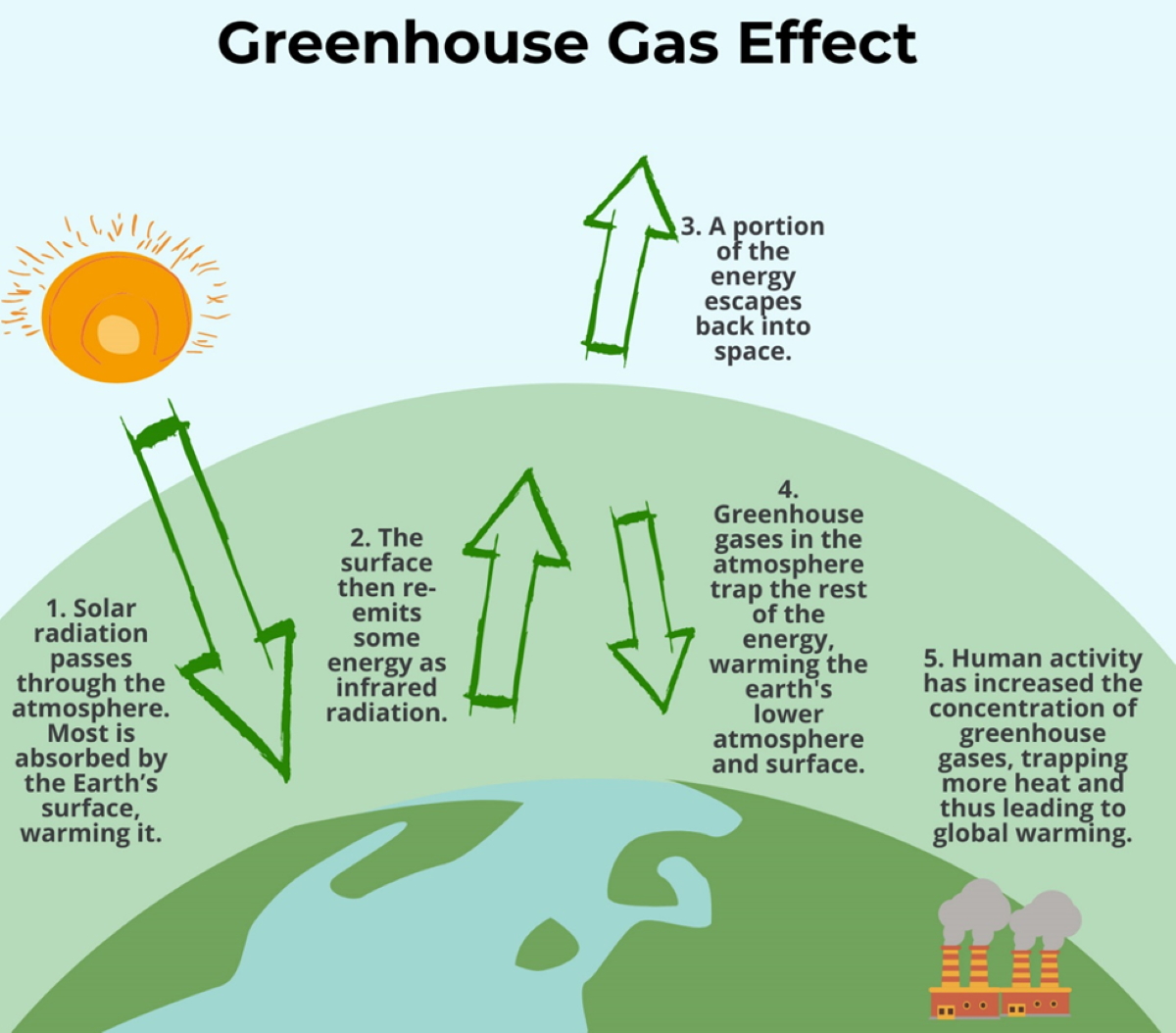
Source: Scotland Climate Assembly
What is the evidence that this warming is driven by capitalism-imperialism?
There is a natural carbon cycle. Animals breathe in oxygen and breathe out carbon dioxide. Plants and the ocean naturally absorb carbon dioxide, but they can’t keep up with all the carbon coming from the burning of fossil fuels. That carbon has been under the earth for many millions of years, and has a different “chemical signature” from other carbon. Scientists can tell that the thicker carbon “blanket” warming the planet today comes from burning these fossil fuels. And this carbon will be around for a long time. Scientists estimate it will stay in the atmosphere for 300 to 1,000 years unless it is taken out.2
And all this carbon is very closely linked to the development of capitalism. Up until about 150 years ago, human activity did not produce many greenhouse gases. But that started to change with the development of coal-powered railroads, larger and larger factories using fossil fuel, and other changes that came with capitalism, including the cutting down of forests. A further huge leap in sending carbon into the atmosphere came with the expansion of the global capitalist economy after World War 2, the much more widespread use of cars and electricity especially in imperialist countries like the U.S.3 This chart shows how, around 1840, when the Industrial Revolution took off, there was an upturn in greenhouse gases emitted into the atmosphere, and that around 1940, the time World War 2 began, emissions greatly accelerated and this has continued to now:
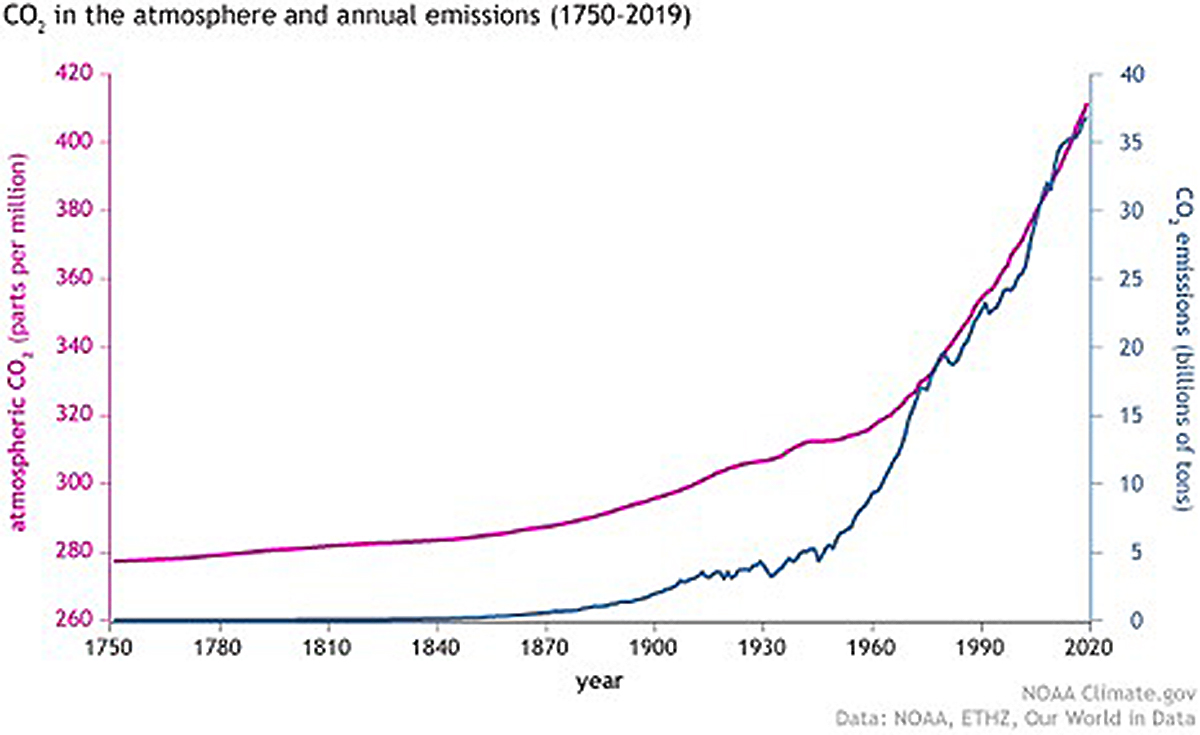
And here, you can see what sections of the economy produce carbon in the U.S.:
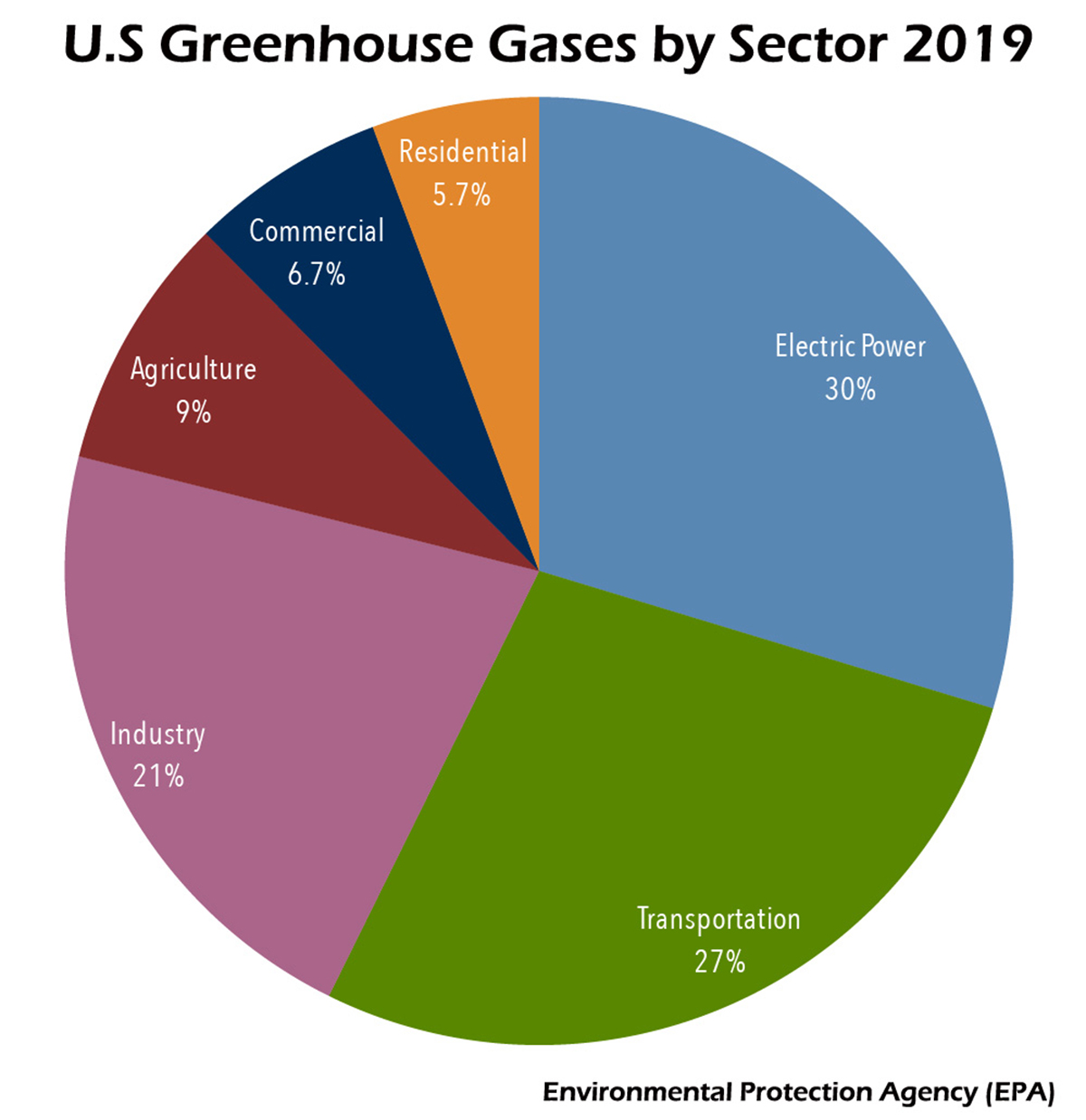
Source: EPA Inventory of U.S. Greenhouse Gas Emissions and Sinks
How does climate change affect the weather we experience?
The way that the rising temperature of the planet impacts the oceans, plants and animals, ice caps in the Arctic and Antarctic, and everything else is complex. As one website puts it:
These changes are happening at different rates and in different ways in response to global warming. As a large scale example, the United States has overall become wetter over the 20th century, while the Sahel region of central Africa has become drier. Locally, the timing and amount of rainfall is changing, which is generally resulting in less frequent but more severe storms. This could lead to increased hillside erosion and flooding, even as overall aridity continues to intensify in some areas... In other words, the climate is becoming more extreme in response to global warming.4
Here is a chart that shows projections by NOAA (National Oceanic and Atmospheric Administration) of how in 2100, some areas of the planet will be much wetter (darker blue), and some much drier (brown)—there will be much more extreme weather:
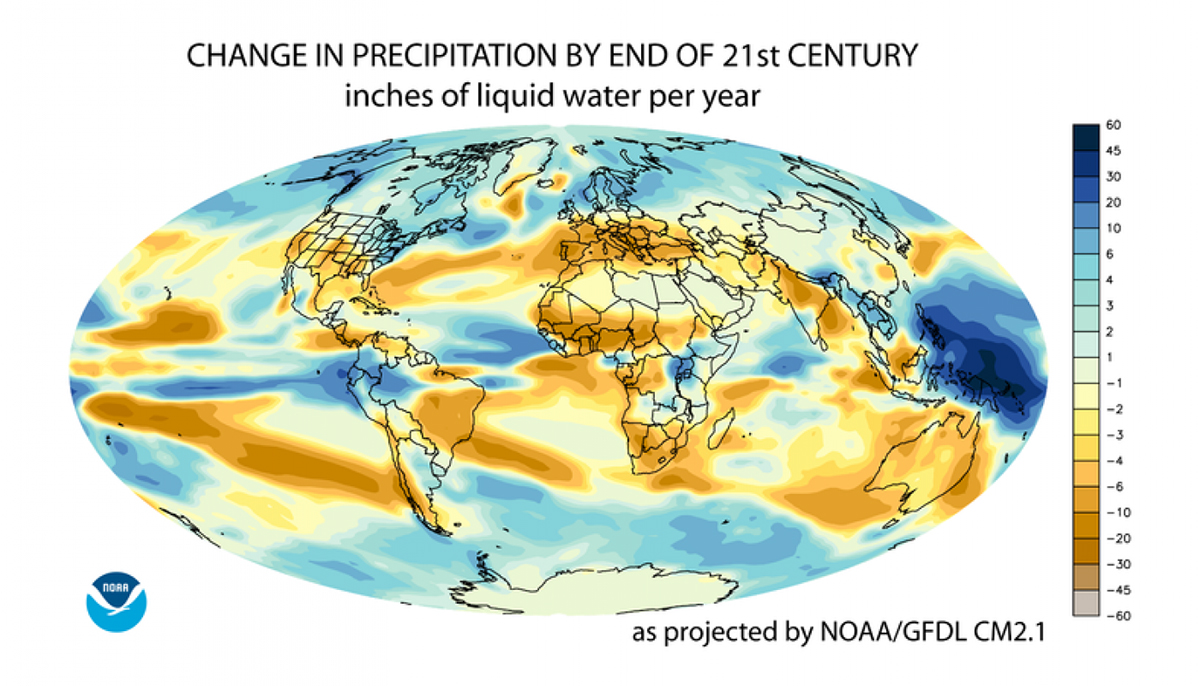
Globally, average temperatures have gone up much faster in the Arctic and in parts of the Antarctic than any other place on Earth. The melting ice caps have already raised the oceans, causing damage to many cities and destroying farm land in places like Bangladesh. Overall, despite not contributing nearly as much to carbon in the air, the global South has been hit much harder by the effects of climate change: hotter climate, droughts in one place and rains and floods in another, more intense hurricanes and storms, rising seas. And this will get much, much worse if things keep on the track they are on.
Here is a video showing how much ice in the Arctic has melted over many decades:
Weekly Arctic sea ice age between 1984 and 2016
Here is a picture of recent floods in India:
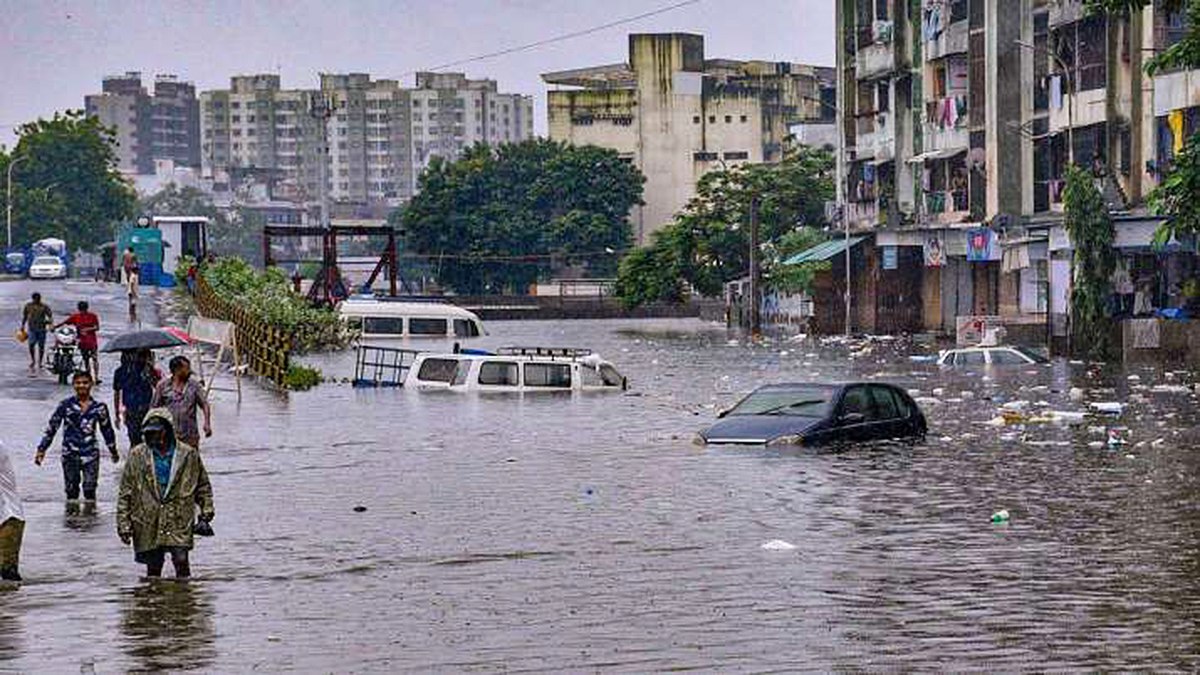
Photo: PTI
What are the long-term dangers to people and to other life on the planet if carbon continues to be injected into the atmosphere as it has—if “business as usual” continues?
Many species have already been driven to extinction by climate change (this can happen when climate changes and seas warm and plants and animals cannot adapt to the new conditions and die out) and by other operations of capitalism-imperialism like logging of tropical rain forests.5
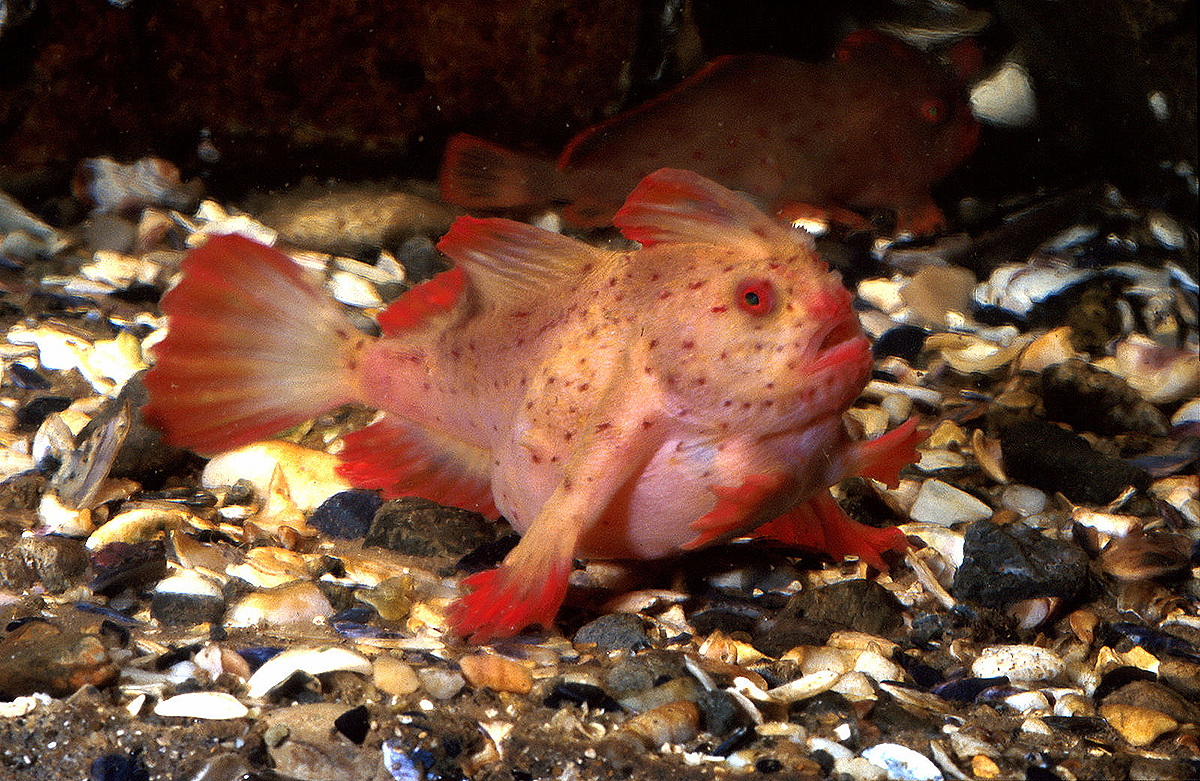
The red handfish, a relative of the extinct smooth handfish. Credit: Mark Green/CSIRO Marine Research Wikimedia (CC BY 3.0)
When a species dies out, a great deal is lost and cannot be replaced. Each form of plant and animal life is a unique product of millions of years of evolution, and plays a role in the larger tapestry of life on earth. Life is an extremely complex system, which has different regions and many levels of inter-connection and inter-dependency, many ecosystems, and all of life is ultimately tied together. One concern of environmental scientists is ecosystem collapse. For example, a system like the coral reefs support many, many species that live parts or all of their lives in the reefs. This includes many species of fish and seafood people depend on, and what happens in the reefs ultimately impacts the oceans as a whole. Right now the coral reefs are all under stress and some have collapsed. Scientists estimate about 90 percent will be gone by the 2030s. Warming water kills the organisms that make the reefs, and more acidic ocean water does the same. Collapse of the reefs, and other major ecosystems, could add up to something that makes it impossible for human beings to live on the planet.
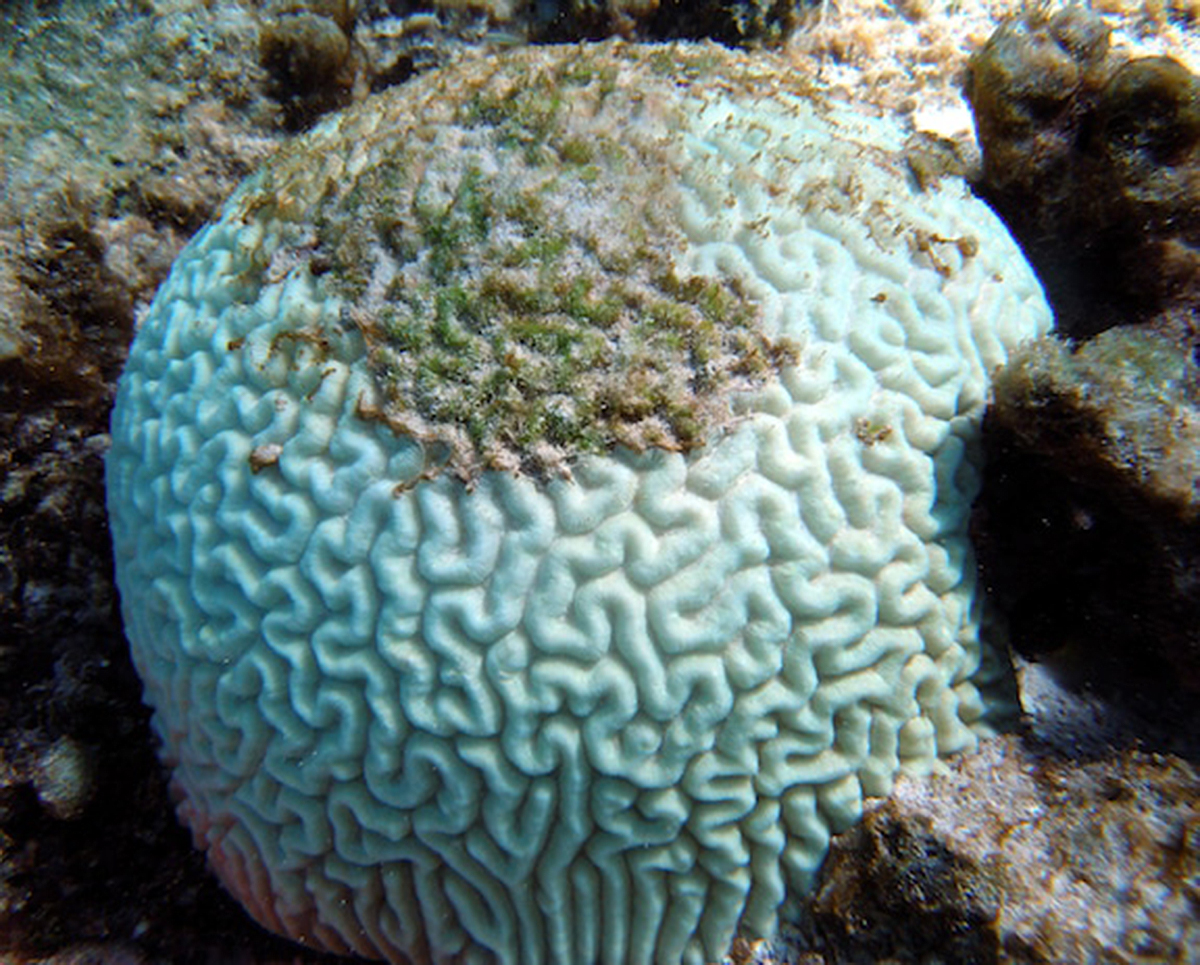
This photograph shows a bleached brain coral. A main cause of coral bleaching is warming oceans. Ocean acidification also stresses coral reef communities. Credit: NOAA
This system and those who rule over it are not capable of carrying out economic development to meet the needs of the people now, while balancing that with the needs of future generations and requirements of safeguarding the environment. They care nothing for the rich diversity of the earth and its species, for the treasures this contains, except when and where they can turn this into profit for themselves.... These people are not fit to be the caretakers of the earth.
Bob Avakian, BAsics 1:29
1. Climate Basics for Kids, Center for Climate and Energy Solutions [back]
2. NASA Global Climate Change website : https://climate.nasa.gov/news/2915/the-atmosphere-getting-a-handle-on-carbon-dioxide/ [back]
3. This article by Raymond Lotta goes deeply into why this system, capitalism-imperialism, cannot stop its destruction of the planet: “50 Years Since Earth Day 1: Reflections on the Catastrophe That Is Capitalism-Imperialism. [back]
4. “What Is Climate Change,” National Parks Service. [back]
5. Here is an article which lists species extinct or thought extinct by 2020: “What We’ve Lost: The Species Declared Extinct in 2020.” [back]
Capitalism-Imperialism Is Destroying the Planet... Only Revolution Gives Humanity a Real Chance to Save It
Environmental Emergency Resource Page
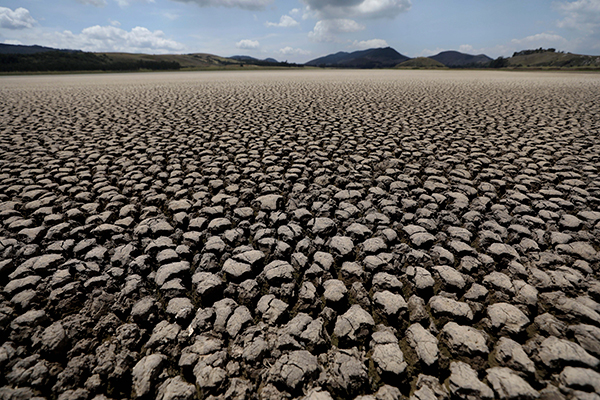
The lakebed of Colombia's Suesca lagoon.
See also:
50 Years Since Earth Day 1: Reflections on the Catastrophe That Is Capitalism-Imperialism
by Raymond Lotta
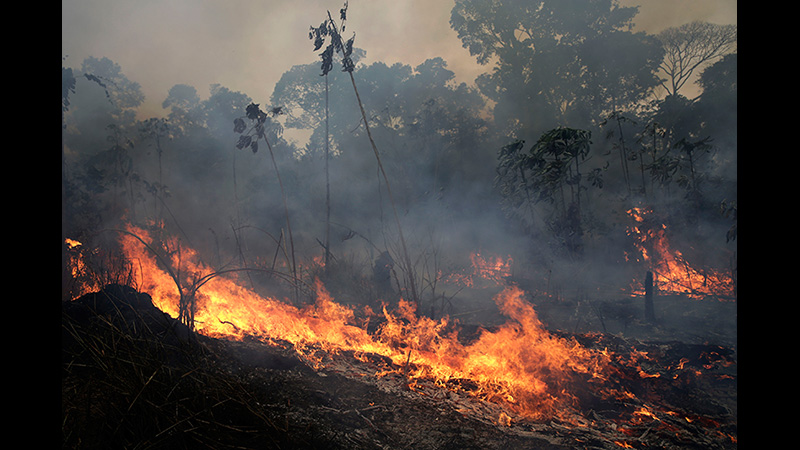
Amazon rain forest, 2019
Get a free email subscription to revcom.us:


